unit 2 Company organization
- 格式:ppt
- 大小:1.46 MB
- 文档页数:45
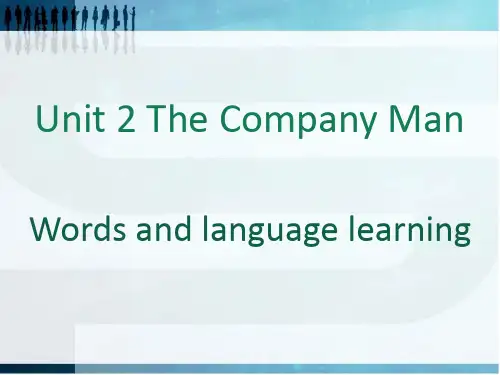
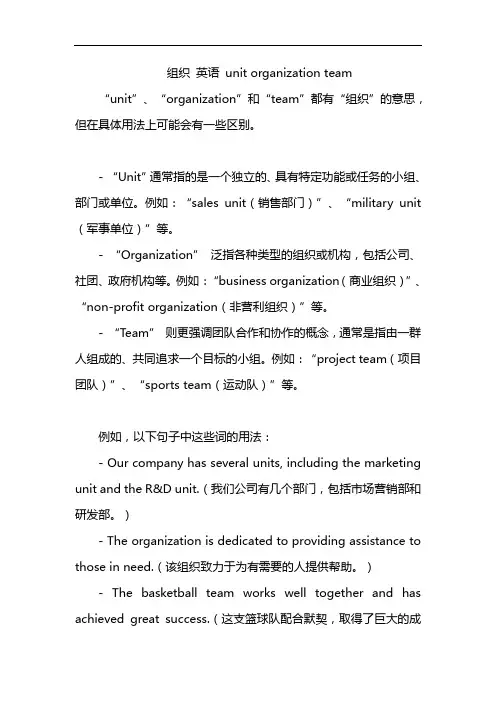
组织英语unit organization team“unit”、“organization”和“team”都有“组织”的意思,但在具体用法上可能会有一些区别。
- “Unit”通常指的是一个独立的、具有特定功能或任务的小组、部门或单位。
例如:“sales unit(销售部门)”、“military unit (军事单位)”等。
- “Organization”泛指各种类型的组织或机构,包括公司、社团、政府机构等。
例如:“business organization(商业组织)”、“non-profit organization(非营利组织)”等。
- “Team”则更强调团队合作和协作的概念,通常是指由一群人组成的、共同追求一个目标的小组。
例如:“project team(项目团队)”、“sports team(运动队)”等。
例如,以下句子中这些词的用法:- Our company has several units, including the marketing unit and the R&D unit.(我们公司有几个部门,包括市场营销部和研发部。
)- The organization is dedicated to providing assistance to those in need.(该组织致力于为有需要的人提供帮助。
)- The basketball team works well together and has achieved great success.(这支篮球队配合默契,取得了巨大的成功。
)在实际使用中,具体选用哪个词要根据上下文和表达的需要来决定。
它们在某些情况下可以互换使用,但在某些特定语境下,可能其中一个词会更贴切。
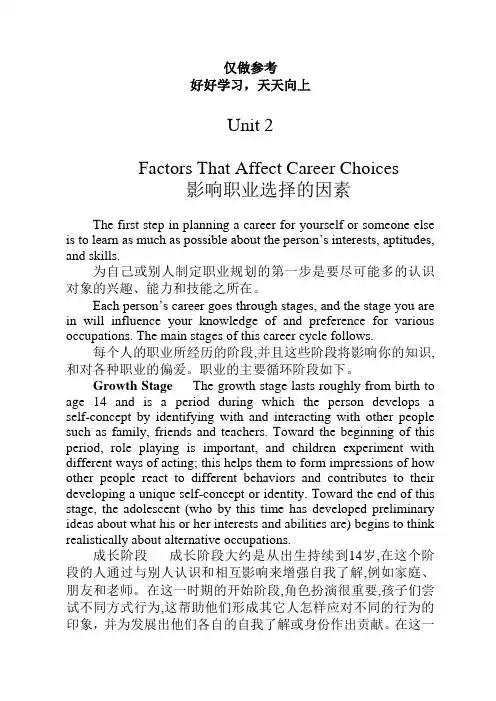
仅做参考好好学习,天天向上Unit 2Factors That Affect Career Choices影响职业选择的因素The first step in planning a career for yourself or someone else is to learn as much as possible about the person’s interests, aptitudes, and skills.为自己或别人制定职业规划的第一步是要尽可能多的认识对象的兴趣、能力和技能之所在。
Each person’s career goes through stages, and the stage you are in will influence your knowledge of and preference for various occupations. The main stages of this career cycle follows.每个人的职业所经历的阶段,并且这些阶段将影响你的知识,和对各种职业的偏爱。
职业的主要循环阶段如下。
Growth Stage The growth stage lasts roughly from birth to age 14 and is a period during which the person develops a self-concept by identifying with and interacting with other people such as family, friends and teachers. Toward the beginning of this period, role playing is important, and children experiment with different ways of acting; this helps them to form impressions of how other people react to different behaviors and contributes to their developing a unique self-concept or identity. Toward the end of this stage, the adolescent (who by this time has developed preliminary ideas about what his or her interests and abilities are) begins to think realistically about alternative occupations.成长阶段成长阶段大约是从出生持续到14岁,在这个阶段的人通过与别人认识和相互影响来增强自我了解,例如家庭、朋友和老师。

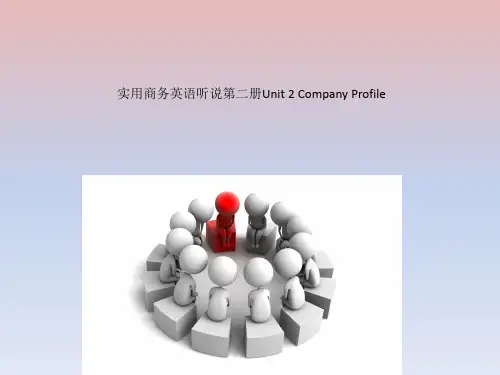
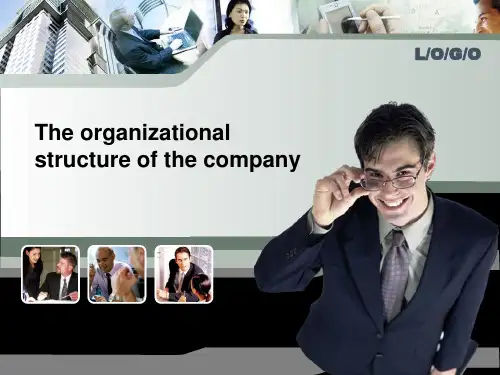
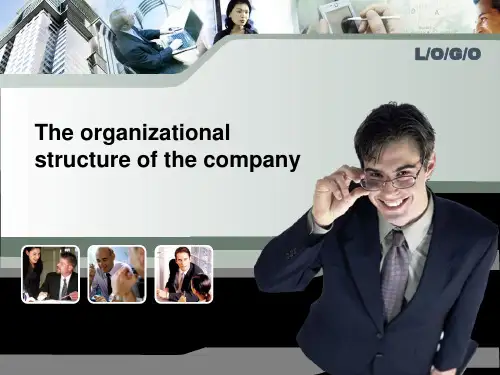

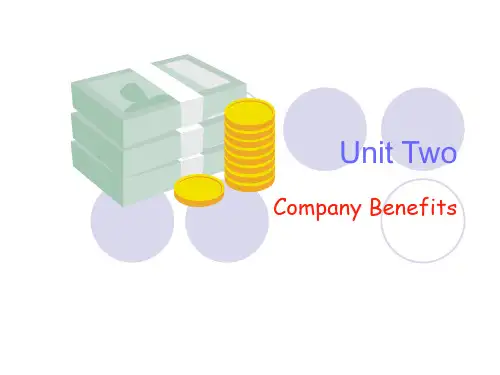
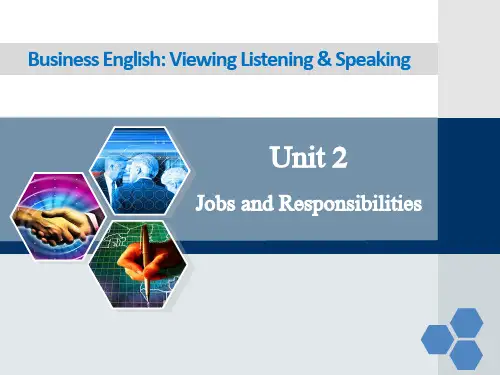

文章标题Management English Unit 2 Essay: Exploring the Essenceof Effective LeadershipIn the realm of management, leadership stands as a pivotal component, shaping the direction and dynamics of organizations. The second unit of our Management English course delves deeply into the intricacies of effective leadership, a subject that is both complex and vital forany aspiring manager. This essay aims to explore the key attributes and strategies that constitute successful leadership, drawing insights from both theoretical frameworks and practical examples.Firstly, effective leaders possess a clear vision and a strong sense of direction. They are able to articulate a compelling vision for the future of their organization, inspiring followers to share in their enthusiasm and commitment. This vision serves as a guiding star, helping the team navigate through challenges and uncertainties. Additionally, effective leaders are able to alignindividual goals with the overall organizational objectives, ensuring that everyone is working towards a common purpose.Secondly, successful leaders demonstrate excellence in communication. They are skilled at listening actively, understanding the needs and perspectives of their team members, and responding with empathy and clarity. Effective communication is not just about speaking; it's also about listening, asking questions, and providing feedback. By fostering an open and inclusive communication environment, leaders create a culture of trust and collaboration within their teams.Moreover, effective leaders are adept at decision-making. They possess the ability to assess complex situations quickly and accurately, weighing the pros and cons of different options and making informed decisions. This requires not only analytical skills but also a keen understanding of the organization's values and strategic goals. By making timely and rational decisions, leaders ensure that their teams are able to respond quickly to changing circumstances and seize opportunities for growth. Furthermore, successful leaders are committed to personal and professional development. They are constantly seeking to improve their skills and knowledge, both throughformal training and informal learning experiences. This ongoing development not only enhances their leadership capabilities but also serves as a role model for their team members, encouraging them to pursue their own growth and development.In addition to these key attributes, effective leaders also exhibit a range of behavioral characteristics that contribute to their success. For instance, they demonstrate integrity and honesty in their dealings with others, earning the trust and respect of their team members. They also exhibit flexibility and adaptability, allowing them to navigate through changing environments and challenges with ease.Practical examples further illustrate the importance of these leadership qualities. Consider the case of a successful CEO who transformed a struggling company into a market leader. This leader was able to articulate a clear vision for the company's future, aligning the goals of individual employees with the overall strategic direction. Through effective communication and collaboration, he built a team that was committed to achieving this vision. Hisdecision-making skills were instrumental in guiding the company through tough times, and his personal development and learning attitude set an example for the entire organization.In conclusion, effective leadership is a multifaceted concept that requires a combination of attributes, strategies, and behaviors. By cultivating a clear vision, communicating effectively, making informed decisions, and continuously developing their skills, leaders can inspire and guide their teams towards success. The insights gained from the second unit of our Management English course provide a valuable framework for understanding and practicing effective leadership in today's complex and dynamic business environment.**管理英语二单元二作文:探索有效领导的本质** 在管理领域,领导力是一个至关重要的组成部分,它塑造着组织的方向和动力。
新编剑桥商务英语(初级)学生用书_答案1. Unit 1: Getting StartedReading Task1.The United Nations International Children’s Emergency Fund.2.Its headquarters is in New York City, USA.3.To advocate for the protection of children’s rights and improve their lives.4.The rights and well-being of every child. Vocabulary Task1.satisfy2.temporarily3.repair4.shipment5.suitableListening Task1.False2.True3.True4.False5.False2. Unit 2: CommunicationReading Task1.People working in multinational companies.2.Because of differences in culture, customs, and business practices.3.Cultural sensitivity, adapting communication style, and understanding non-verbal communication.4.Polite greetings, appropriate dress code, and being punctual.Vocabulary Task1.manage2.appropriate3.gesture4.moderate5.standardListening Task1.C2.B3.A4.B5.A3. Unit 3: Business TravelReading Task1.It helps to establish and maintain business relationships.2.Making hotel reservations, booking flights, and arranging transportation.3.They need to be aware of local customs, etiquette, and have knowledge of the local language.4.Preparation, documentation, and being organized. Vocabulary Task1.navigate2.accommodation3.confirm4.transport5.locateListening Task1.B2.A3.C4.B5.C4. Unit 4: Company OrganizationReading Task1.To understand the structure, roles, and responsibilities within a company.2.It provides a clear understanding of the hierarchical structure within a company.3.It helps to ensure effective communication and coordination between different departments.4.Functions, departments, and positions. Vocabulary Task1.assign2.colleague3.document4.policy5.superviseListening Task1.C2.A3.B4.C5.A5. Unit 5: Job InterviewsReading Task1.It is an opportunity for employers to evaluate the suitability of candidates for a specific job position.2.Preparing for commonly asked questions and practicing good body language.3.Being well-groomed, dressing appropriately, and being confident.4.Asking relevant questions and expressing gratitude for the opportunity.Vocabulary Task1.evaluate2.relevant3.confident4.opportunity5.gestureListening Task1.C2.B3.A4.B5.A6. Unit 6: Telephone SkillsReading Task1.It is a commonly used tool in business communications.2.To ensure effective communication and maintain good business relationships.3.Answering professionally, speaking clearly, and paying attention to tone and pace.4.Taking messages, transferring calls, and resolving issues.Vocabulary Task1.effectively2.professional3.manner4.transfer5.issueListening Task1.B2.C3.A4.B5.C7. Unit 7: Emails and Writing SkillsReading Task1.Emails are used for quick and efficient communication.2.Formal and informal emails.3.Subject line, greeting, body, and closing.4.Being concise, using proper grammar and punctuation, and proofreading.Vocabulary Task1.efficient2.formal3.grammar4.proofread5.conciseListening Task1.C2.B3.A4.B5.A8. Unit 8: PresentationsReading Task1.To effectively communicate information, ideas, and proposals to a group of people.2.Planning, creating visual aids, and practicing the delivery.3.Confidence, eye contact, and engaging with the audience.4.Structuring the presentation, using visual aids, and answering questions.Vocabulary Task1.effectively2.visual3.audience4.engage5.structureListening Task1.B2.C3.A4.B5.C9. Unit 9: Business CorrespondenceReading Task1.It is written communication between businesses or individuals.2.To provide information, make inquiries, and establish business relationships.3.Proper salutation, clear and concise content, and professional closing.4.Business letters, memos, and emails.Vocabulary Taskmunication2.inquiries3.content4.professional5.memosListening Task1.A2.C3.B4.C5.A10. Unit 10: Socializing and EntertainmentReading Task1.It helps to build rapport and strengthen business relationships.2.Attending social events, dining out, and participating in recreational activities.3.Appropriate behavior, cultural sensitivity, and beinga good listener.4.Small talk, cultural knowledge, and expressing gratitude.Vocabulary Task1.strengthen2.appropriate3.behavior4.listener5.gratitudeListening Task1.C2.B3.A4.B5.CThis is the answer key for the New Cambridge Business English (Ele mentary) Student’s Book.。
Unite 2. Significance of Management管理的重要性Read the following questions first, which will help you understand the text below better, and then answer the questions after reading the text carefully.先看看下面的问题,这些问题将有助于你更好地理解后面的课文,仔细地读完课文后再回答这些问题。
1. How do you understand the sentence "This interdependence, and the prominent role of organizations in our lives, highlights the importance of management."?你怎么理解这句话:组织的杰出作用和组织之间的相互依赖性突出了管理的重要性。
2. Why do you think management is important for an organization? Please describe the reason in great detail.为什么你认为管理对一个组织是重要的?请详细地描述一下原因。
3. What is the essence of management theory in your viewpoint?你的观点中,管理理论的本质是什么?Simply speaking, management is what managers do. But in order to understand the definition of management, that statement seems too simple. To our great surprise, the variety of approaches to management analysis, the amount of research, and the great number of differing views have resulted in much confusion as to what management is, what management theory and science is, and how managerial events should be analyzed. As a matter of fact, Harold Koontz many years ago called this situation "the management jungle". Though new approaches have developed and older approaches have taken on some new meanings with some new words attached, the developments of management science and theory still have the characteristics of a jungle. Thus in this passage we want to discuss Importance of Management, Definition of Management, and Major functions of Management respectively.简单地说,管理就是管理者所做的事情。